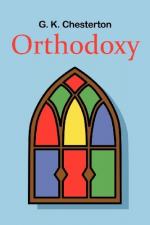
|
| Name: _________________________ | Period: ___________________ |
This test consists of 5 short answer questions, 10 short essay questions, and 1 (of 3) essay topics.
Short Answer Questions
1. What does Chesterton not mean by the word "orthodoxy"?
2. In the middle of Chapter One, why does Chesterton say this book is a joke on him?
3. As the determinist is confronted with the problem of sin, what does Chesterton say that he believes in?
4. What does Chesterton say that moralists, including H. G. Wells, have turned into wickedness?
5. As revealed in Chapter Two, what is the secret of mysticism?
Short Essay Questions
1. In Chapter I, Introduction in Defense of Everything Else, Chesterton states that he hates the defense of something that cannot be proved or disproved. How is this important for the rest of the book?
2. Materialistic fatalism has been credited with being merciful, though Chesterton says this is far from the truth. Why can fatalism not be merciful?
3. Why does Chesterton's second notion of fairyland entail praise?
4. Humility is chiefly understood chiefly as a restraint on a man's arrogance and boasting. What is Chesterton's argument concerning humility? What example does he give to illustrate a humble view of the world?
5. What role does Mr. G. S. Street play in the book?
6. Materialism is a much narrower belief than Christianity, in fact, more than any religion. What reasons does Chesterton give for this? How does it relate to the discussion of madness and sanity?
7. As he begins to talk about fairy land, what does Chesterton argue about rationalism? How does this open the door to excitement in the world?
8. Chesterton asserts that though the world has its share of evils, the modern virtues actually have a more devastating effect. How does he support this radical idea? What relationship does this have to Christianity?
9. What does Chesterton say is the spirit of the law in fairy land? Why is this not inconsistent?
10. In Chapter III, The Suicide of Thought, what is Chesterton's opinion of the skeptic? Why does the skeptic not have the right to speak out against anything? Why, contrarily, is he always speaking out against things?
Essay Topics
Write an essay for ONE of the following topics:
Essay Topic 1
What reasons does Chesterton give for saying that fairy land is the land of common sense? What are his comparisons to rationalism and religion? How far can this argument go? In other words, do common sense and fairy land do have a meaningful interaction?
Essay Topic 2
How does Christianity answer illogical questions in the world? Do you think these answers are valid? Why was Chesterton puzzled at these answers, and how did it lead him to question atheism?
Essay Topic 3
Why is the worship of the god within the worst religion, according to Chesterton? How does a worshiper of the god within regard the rest of the world? What is the endpoint of this religion?
|
This section contains 1,523 words (approx. 6 pages at 300 words per page) |

|




